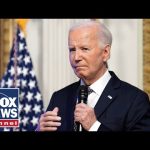The political landscape is heating up once again as the stage is set for President Donald Trump’s expected return to the White House. Amid rising tensions and pivotal decisions, many are looking to how Trump’s dynamic approach to foreign relations and economic policy will unfold, especially concerning his proposal for a 25% tariff on imports from Mexico and Canada, along with an additional 10% tariff on goods from China. This move has sparked curiosity and debate, not only among economists but also in political circles. As leaders from Mexico and Canada seem eager to stand alongside Trump, one can’t help but wonder how President Joe Biden, who appears to be taking a more measured approach, will respond.
Jason Miller, a key advisor to President Trump, suggests that Trump’s ability to take action even before his official return demonstrates the kind of leadership he intends to provide. Whether it’s boosting the economy or fixing border security, Trump’s influence is felt far and wide—even before he takes the oath of office again. The contrast between Trump and the current administration couldn’t be clearer. While Biden and Vice President Kamala Harris have faced criticism for inaction regarding the border and other pressing issues, Trump is already making waves before he steps back into the Oval Office.
The tariffs proposed by Trump are not just another campaign promise; they are seen as a strategic negotiation tool. Critics might claim that this approach could complicate relationships with Canada and Mexico, but supporters argue it’s a savvy method to ensure stronger domestic economic health. Unlike current inflation worries, many remember how Trump’s first term ended with record-low inflation rates. As analysts speculate about potential unrest that might arise from these tariffs, Trump’s supporters are enthusiastic about the prospects of revitalizing the economy.
However, the conversation does not end at tariffs and the economy. It also extends to pressing matters like national security. Trump’s firm stance on foreign hostage situations has sent strong signals, with hints that there could be severe repercussions for countries that do not take American hostages seriously. His assertiveness, a sharp contrast to Biden’s more cautious approach, underscores a broader philosophy of leadership that prioritizes decisive action.
Furthermore, the fallout from the COVID-19 pandemic continues to be part of Trump’s narrative as he renews calls for accountability from China regarding the origins of the virus. The dynamic of international relations is under a microscope, and Trump is positioning himself as a leader who will not shy away from taking robust actions. His potential imposition of economic reparations on China is indicative of a broader strategy aimed at holding accountable those he believes have contributed to significant global crises.
As Trump prepares for another political chapter, all eyes will be on how he marries these assertive economic policies with issues of diplomacy and national security. His early actions and statements suggest a commitment to restoring America’s power on the world stage and securing its economic future. For now, supporters eagerly anticipate the possibilities that lie ahead and wonder if, come January 2025, they will witness the dawn of another transformative era. Meanwhile, America watches closely, ready to see how this all unfolds, especially as major appointments and strategies are rolled out. With so much at stake, it seems the excitement is just beginning.




